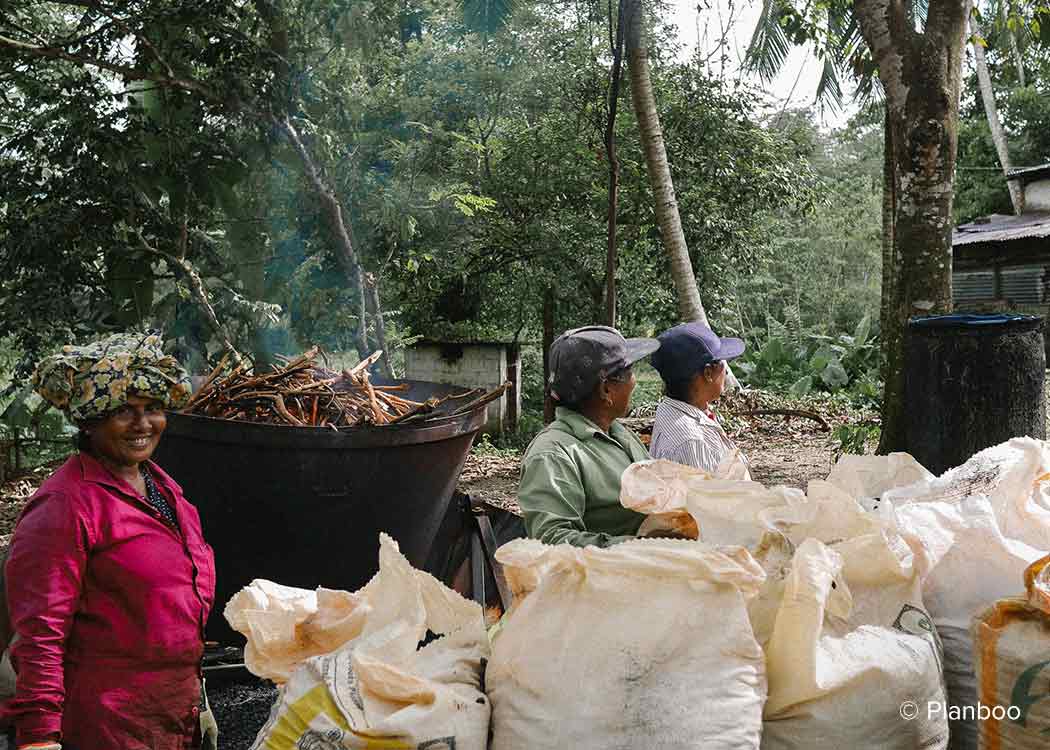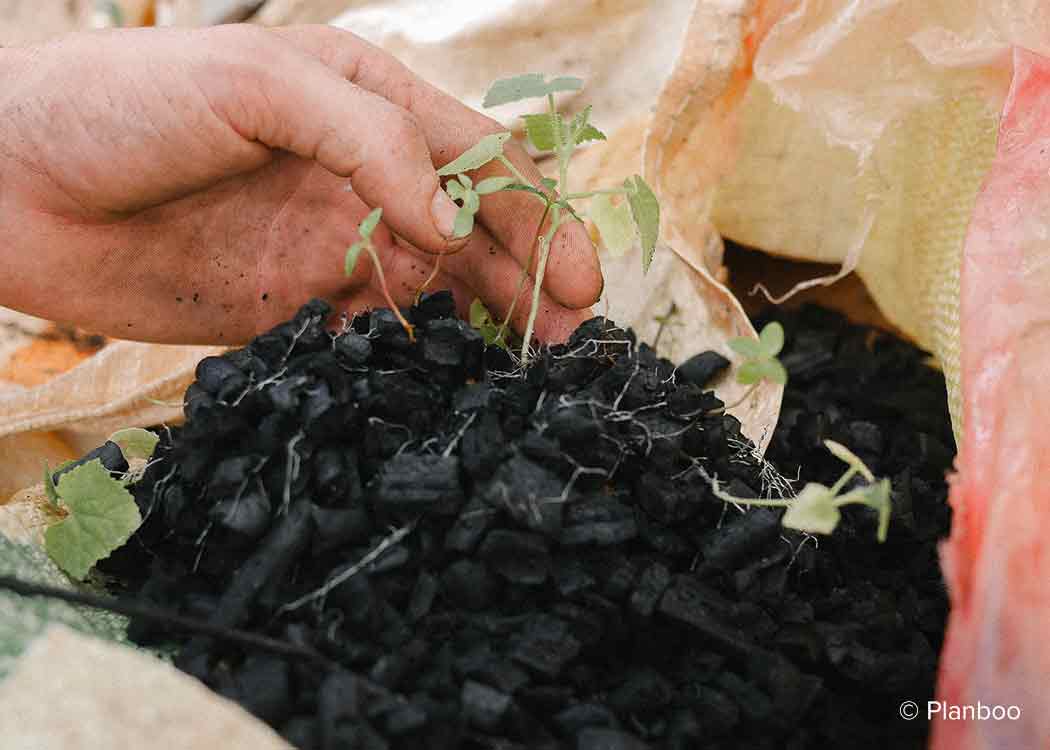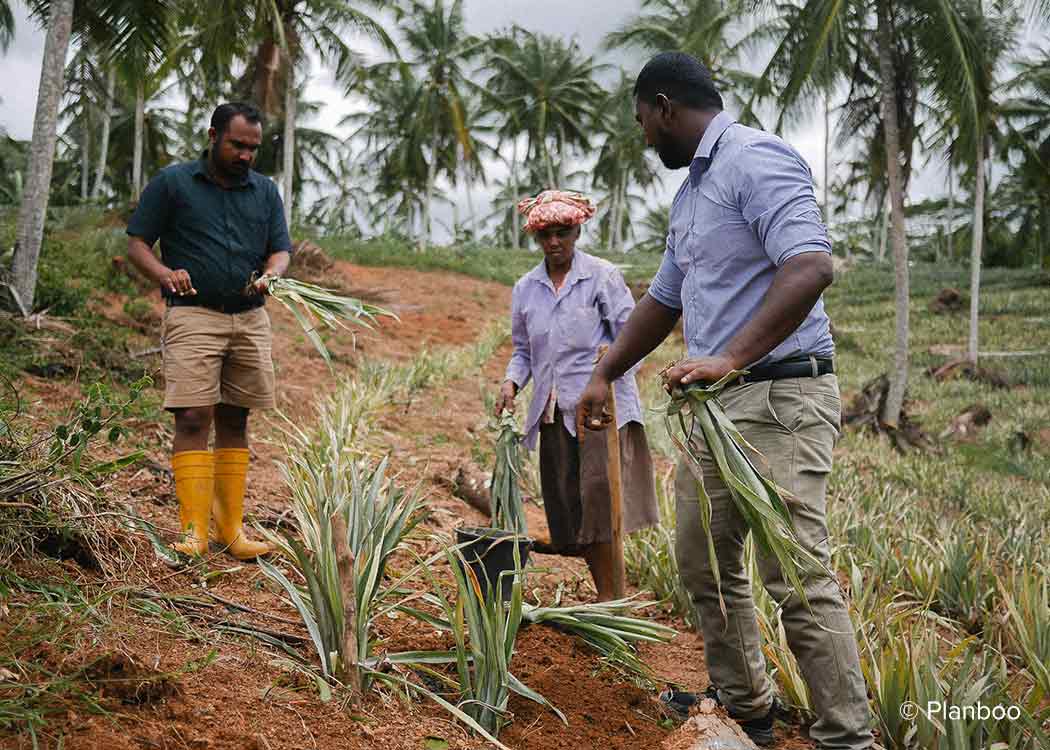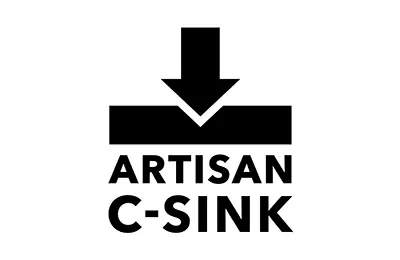Sri Lanka’s renowned agricultural heritage is a significant source of economic growth and tourism appeal. However, producing tea and other products also generates large amounts of waste, typically burned, resulting in CO2 emissions. This project avoids burning crop waste by transforming it into biochar, a charcoal-like substance that creates permanent carbon removals. Farmers can also use or sell biochar as an organic soil additive to reduce chemical pollution, increase income, and improve crop yields.
Where & Why
Nestled in Sri Lanka’s lush central highlands, the Kandy District is the birthplace of Sri Lanka’s tea industry. It was here where Sri Lanka’s first commercial tea estate was planted more than 150 years ago. Today, the rolling hills are carpeted with green tea bushes, tended by farmers using age-old methods.
Though tea production is the dominant form of agriculture in Kandy, local farmers also grow spices and other crops on a smaller scale. Sri Lanka’s agricultural products, such as Ceylon tea and cinnamon, are renowned globally for their high quality and unique flavor, making them a valuable source of foreign exchange. The island nation produces 80-90% of the world’s true cinnamon and is the world’s third-largest exporter of tea.
Agriculture is an integral part of Sri Lanka’s identity. From the ingredients used in traditional cuisine to the livelihoods supported by the industry, it is a vital part of Sri Lankan life. Sri Lanka’s agricultural heritage and scenery are also a core part of the local tourism experience. There are many opportunities for visitors to immerse themselves in the meticulous arts of tea and cinnamon production, such as trekking through a picturesque plantation, harvesting the leaves, or sipping on a freshly brewed cup of Ceylon tea. Even train rides in Sri Lanka are a tea-infused experience, with the scenic journey from Kandy to Ella being the most iconic.
Unfortunately, cultivating Sri Lanka’s beloved crops has harmful environmental and health consequences. According to the UN’s Food and Agriculture Organization (FAO), Sri Lanka generates over 11 million pounds (5 million kilograms) of organic waste daily. Traditionally, this waste is burned, producing hazardous smoke and releasing climate-warming CO2 into the air. On top of this, excessive use of chemical fertilizers creates an imbalance of nutrients in the soil, degrading its fertility. These chemicals also endanger human health when runoff leaches into drinking water. In rural parts of Sri Lanka, fertilizer contamination of water has led to widespread health complications such as kidney disease.
This stark reality demands more sustainable, organic farming practices. In 2021, the Sri Lankan government banned the import and use of chemical fertilizers. However, farmers were unprepared for this sudden transition, and due to the challenges, the ban was short-lived. Shifting to sustainable farming will require more than an ultimatum. It will entail enabling activities such as increasing the availability of organic fertilizers, incentivizing its use, and educating on sustainable farming practices.
How & Who
This project transforms agricultural waste from tea, cinnamon, and rubber plantations in Kandy into an environmentally friendly and valuable product. The project developer, Planboo, works closely with the plantation owner, Elpitiya Plantations, to create permanent carbon removals using ancient agricultural practices and innovative technology.
This begins by heating crop residues such as tea stems, natural rubber latex sludge, and cinnamon bark waste in a kiln with low oxygen levels between 650º to 1,000ºC. This process creates a charcoal-like substance called biochar. While it might not look exciting, biochar possesses a special climate-fighting property – a single kilogram removes roughly 2.2 kilograms of CO2 equivalent from the atmosphere. Because it retains moisture and attracts microorganisms, biochar can be used as an organic soil additive to improve soil health. Farmers mix the biochar with compost and plow it into the ground, where it, and the embodied carbon, will remain for up to 1,000 years.
This project shows that switching to organic farming is possible and financially attractive. Biochar is not just better for the environment and human health, it also improves crop yields, leading to greater revenues and enhanced food security. Elpitiya Plantations reap additional benefits by selling their biochar to other farmers. In addition, they earn $120 for each carbon credit. Furthermore, biochar production creates new job opportunities for the local community. Currently, four Sri Lankans are employed by the project as kiln operators.
This project is still in its early stages, but Planboo hopes to scale it up quickly thanks to support from carbon credit sales. They expect to produce nearly 500,000 liters of biochar in 2024, removing 111 metric tonnes of CO2e.

Environmental Benefits
- Mitigates climate change by locking carbon in the ground for up to a thousand years
- Improves soil and water quality by encouraging organic farming

Community Benefits
- Reduces harmful health conditions caused by water and air pollution
- Increases crop yields, improving food security
- Generates jobs and extra income for agricultural communities
Project Type

Innovative Tech
Location
Annual CO2 Reduction
111 MT CO2e (expected for 2024)
SDGs Supported
Verification Standard
Project Developers
Planboo
Project Documents



Offset your Travel Footprint
Calculate and offset the carbon footprint of your flight in seconds via our online carbon calculator. Already know your carbon footprint? Click the option to “offset now.”








